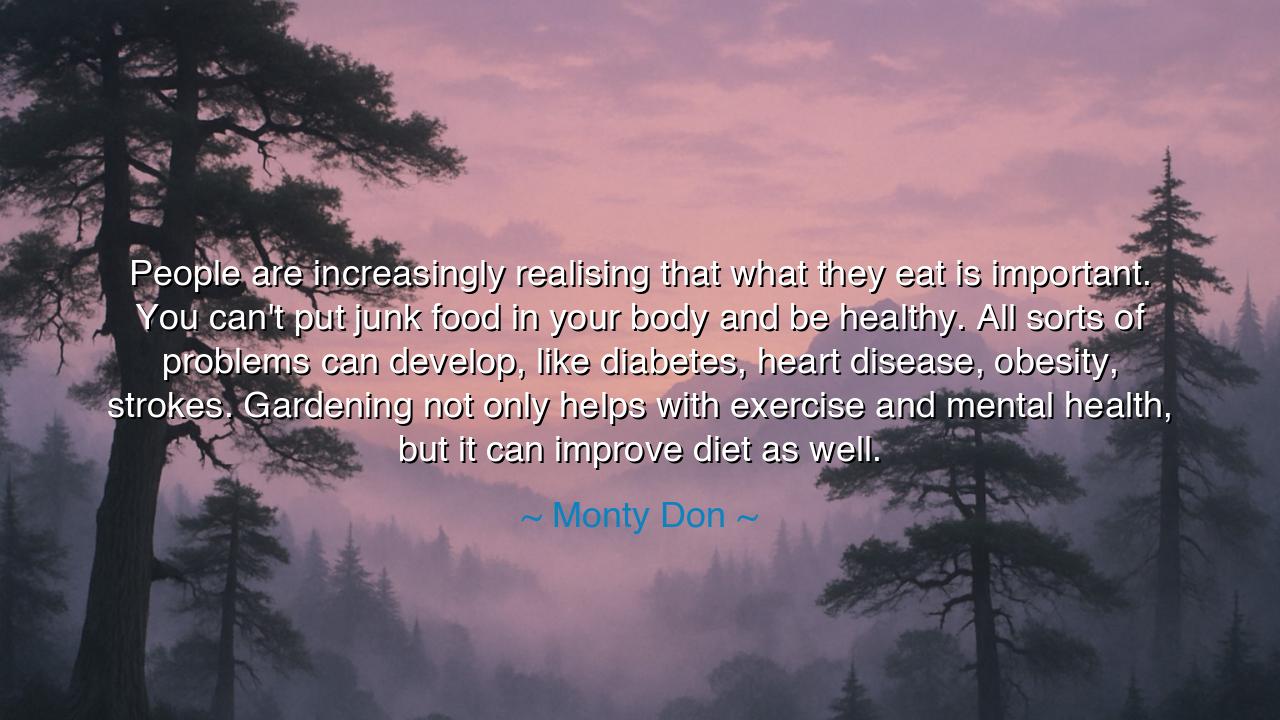
People are increasingly realising that what they eat is
People are increasingly realising that what they eat is important. You can't put junk food in your body and be healthy. All sorts of problems can develop, like diabetes, heart disease, obesity, strokes. Gardening not only helps with exercise and mental health, but it can improve diet as well.






Hear me, children of the earth, and listen to the wisdom of Monty Don, who spoke these words not as commandment, but as remembrance: “People are increasingly realising that what they eat is important. You can’t put junk food in your body and be healthy. All sorts of problems can develop, like diabetes, heart disease, obesity, strokes. Gardening not only helps with exercise and mental health, but it can improve diet as well.” In these simple words echoes an ancient truth — that health, both of body and of soul, begins in the soil, in the living bond between human and earth.
Long before the age of engines and glittering screens, the elders of every land knew this: that to eat was to commune with the divine. Food was not mere fuel but life made visible. The harvest was sacred, the meal a ritual of gratitude. But now, in this hurried age, many have forgotten. They eat what is easy, not what is living. They swallow what is manufactured, not what is grown. And their bodies, once temples of vitality, grow weary under the weight of unholy feasts. Monty Don, the gentle prophet of the garden, calls us back — back to the soil, back to the rhythm of the seed and the season, back to the discipline of care.
Think of the people of ancient Greece, who believed that health was harmony — a balance between earth, water, air, and fire. Hippocrates, father of medicine, declared, “Let food be thy medicine and medicine be thy food.” He knew, as Monty Don knows, that sickness often begins not in fate, but in the fork. The poison of sloth and indulgence lies not only in what we eat, but in how we have forgotten to honor the act of nourishment. The one who grows his meal with his hands will never eat carelessly, for he knows the story of every leaf.
The garden, then, is not merely a place of flowers and leisure; it is a temple of restoration. In it, the body bends and strengthens, the mind quiets its noise, and the heart learns patience once more. Each seed planted is an act of hope; each weed pulled, a letting go of what no longer serves. To till the soil is to remember that all life — including your own — is sustained by attention, humility, and time. And when the fruits of that labor are eaten, they do more than fill the belly — they awaken the ancient covenant between human and earth.
In our modern kingdoms of concrete and plastic, disease has become a silent tyrant. Diabetes, heart disease, obesity, and strokes — these are not mere ailments, but messages. They whisper: “You have strayed from the natural order.” And so, Monty Don’s voice is both gentle and urgent, reminding us that the cure does not lie only in medicine, but in the return to balance. To eat fresh food, to grow it with your own hands, is to reclaim sovereignty over your health. It is to heal the disconnection that modernity has sown between appetite and awareness.
Consider the story of the Victory Gardens during the Second World War. When fields burned and rations grew scarce, ordinary men and women turned their backyards into sanctuaries of sustenance. They grew carrots and beans, potatoes and herbs — not for profit, but for survival. Those gardens fed not only their bodies but their spirits, uniting communities in purpose and peace. In the same way, your small patch of green — even a few pots on a balcony — can become a fortress of resilience in an age of decay.
The lesson, then, is clear: you are what you cultivate, not only what you consume. The hands that dig in the soil shape the health of the body, and the mind that tends to living things shapes the health of the soul. Eat what is real. Grow what you can. Walk in your garden as one who walks in prayer. Let your meals be born of labor, gratitude, and simplicity, and you will find that the body remembers how to heal itself.
So, dear listener, go forth and plant. Even a single seed can restore a forgotten truth. Let your garden become your gym, your meditation, your pharmacy, your teacher. And when you eat of its fruits, taste not only the sweetness of food — but the harmony of a life once more aligned with nature. For in that harmony lies the secret health the ancients called wholeness, and the moderns have forgotten to name.






AAdministratorAdministrator
Welcome, honored guests. Please leave a comment, we will respond soon